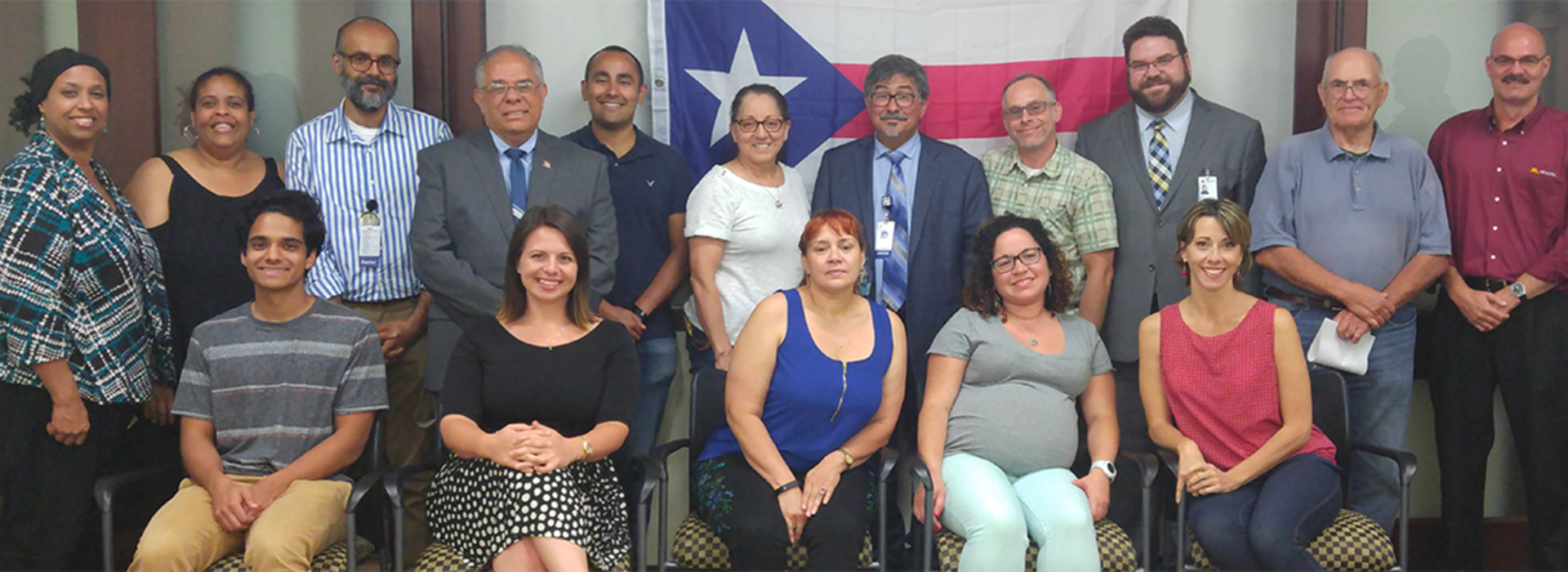
UMN Medical School Faculty and Students Work to Improve Mental Health Issues Found in a Recent Visit to Post Hurricane Puerto Rico
Studies show 30-40% of people impacted by a natural disaster will develop Post Traumatic Stress Disorder (PTSD). Now picture two and a half million people- nearly half of them suffering from PTSD for almost an entire year. That is the current situation in Puerto Rico after Hurricane Maria.
Since the hurricane, a group of University of Minnesota Medical School physicians, students and staff have organized efforts to help the island, including several mission trips to provide supplies and medical expertise.
Ten months after the devastating storm, the group took their 4th trip, this time focusing on the mental health issues citizens are still dealing with related to the hurricane. The team of five UMN Medical School psychiatric and medical faculty, and a group of medical school students visited affected homes and facilities impacted by the Hurricane as well as attended and presented their experience in a local symposium.
“The night we flew in, they were expecting a storm to turn into a hurricane. It dissipated, but what struck me was how everyone was reacting in a really triggered way. The shelves were emptied at the stores- they were really preparing- it had everyone really concerned,” said Matej Bajzer, MD, PhD, Assistant Professor, Department of Psychiatry, University of Minnesota Medical School. “I don’t think it will ever be ‘back to normal’ for the people that went through that disaster.”
This was just one indication for the team that there are still major mental health issues. Another, are the increased suicide rates.
“There are no statistics at this point, but we heard several people talk about noticing an uptick in suicides,” said Miguel E. Fiol, MD, Associate Professor in the Department of Neurology, University of Minnesota Medical School. “There is a lack of data. What we have are impressions.”
Many of those impressions were received first-hand during their visits.
“We wanted to meet with people first hand, not just citizens but in terms of psychiatrist assistance and academic assistance as well,” explained Quentin Gabor, MD, Assistant Professor, Department of Psychiatry, University of Minnesota Medical School, “What we came to understand is there are very capable people there already, doing a great job.”
But they also learned that what they are bringing in terms of education and tactics is needed and appreciated.
“Objectively, going there for two days at first felt like it does nothing- like it is a small drop in a giant lake. The people there know more about trauma than we do. But they are not resentful. In fact, they are grateful and it helps,” remembered Eduardo Colon, MD, Professor, Department of Psychiatry, University of Minnesota Medical School.
Colon was one of several experts, community members and community partners who met about a week after the latest visit to discuss what they experienced as well as next steps. A woman from an earlier mission was present and commented that what she was hearing sounded an awful lot like what she experienced on her trip 10 months ago.
“It seems not much has changed. So, what do we do?” she asked the group.
“I think we are an agent of change. They see us as people “from the outside” and not as a political presence. I think that is an advantage,” answered Fiol. “One lady even called us ‘magicians.’ I think we can have an impact.”
The group is already seeing that impact through the work of two medical students who were on the last mission and now can continue their work thanks to the Helping Hands Grant from the American Psychiatric Association they were recently approved to receive.
Angelina Omodt-Lopez, Roberto Lopez Cervera, Nathan Stratton, and Maria Bryan are part of a small group of University of Minnesota Medical School Students, overseen by Adnan Ahmed, MBBS, Assistant Professor, Department of Psychiatry, University of Minnesota Medical School. They had applied for a $5,000 American Psychiatric Association Helping Hands grant and have just been approved.
The grant proposal was based on a request from Puerto Rican educators who reported increased incidence of suicidality and PTSD-like symptoms in students at Lysander Borrero Terry High School in Villalba, Puerto Rico post-hurricane Maria. The medical students’ initial plans were to use this intervention with the students at the high school. However, based on reports of caregiver burnout and supporting comments from community members and from the students themselves, they decided to focus on the adults first.
The hope is to teach Mindfulness Based Stress Reduction (MBSR) to the teachers at Lysander Borrero Terry to help them deal with the stress of the aftermath of Hurricane Maria. To achieve their goals, the medical students are seeking partnerships with local healthcare professionals in Puerto Rico.
The program, called Puerto Rican Empowerment Through Neurodevelopmental Education (PRENdE), will eventually need more funds to support it. The eventual hope is to produce a sustainable program where the teachers who receive the mindfulness-based intervention can become the administrators of the intervention for other teachers and students in future iterations of the program.
Donate now to support the UMN Medical School Puerto Rico Outreach Fund.